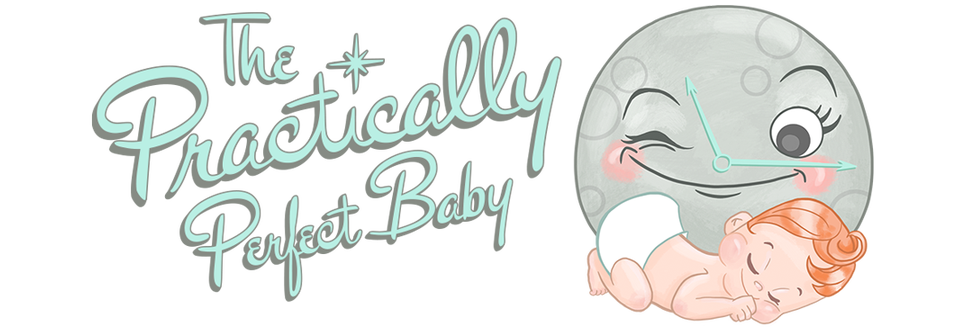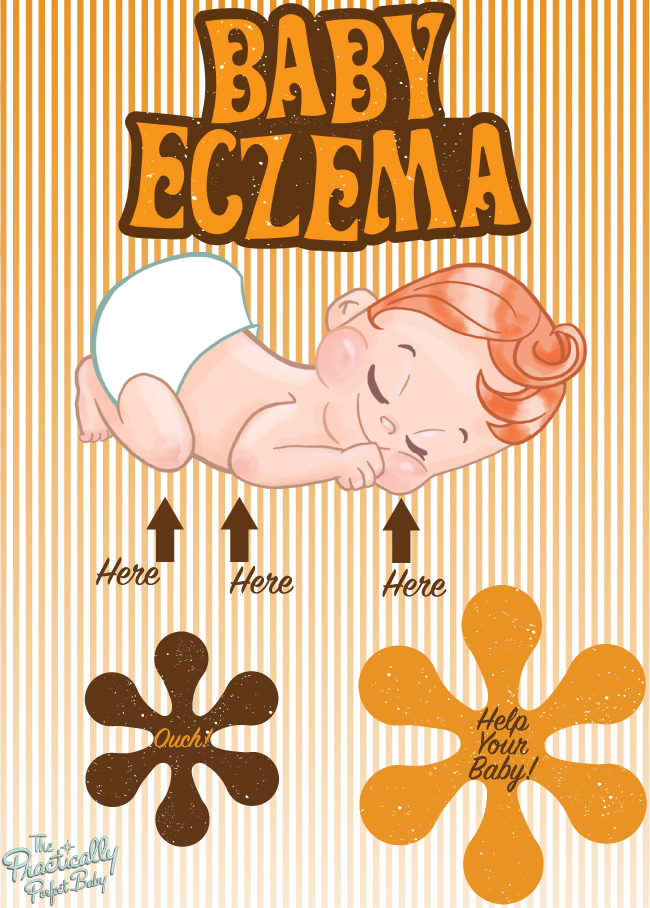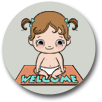All About Baby Eczema & How to Give Relief
BABY ECZEMA
Poor baby! Baby eczema is a chronic, itchy skin condition that usually starts within a child’s first five years of life. It most often occurs in babies during the first six months and it typically lasts into childhood and adolescence — but in some cases it may last into adulthood. Eczema in babies tends to wax and wane — where there are periods of time when the skin appears mildly affected or even normal, alternating with periods of moderate to severe presentation. Some babies have very mild eczema and others have severe eczema (also known as atopic dermatitis). Eczema tends to be more common in families that have a history of eczema, hay fever, and/or asthma. These disorders are all a part of what is called the “atopic triad” (a first or second degree relative, with a history of one of these atopic conditions can often be identified in the family of a child with eczema). Babies with eczema may be more likely to develop allergies or asthma but one does not cause the other.
ECZEMA DIFFERENCES IN BABIES VERSUS TODDLERS
The location and appearance of eczema changes as your baby gets older. In young babies, eczema is most prominent on the cheeks, forehead, and scalp. It may affect most of the body but usually spares the diaper area. At 6 to 12 months of age, it is often worst on the crawling surfaces, the elbows and knees. Around the age of two the distribution changes and tends to involve the creases of the elbows and knees, the wrists, ankles, and hands. It may affect the skin around the mouth and the eyelids. In young babies eczema tends to be more red and weepy. In toddlers and older children it often appears more dry, and the skin may be thickened with prominent skin lines (a skin change called lichenification).
BABY ECZEMA TRIGGERS
Eczema flares occur when the skin is very dry, it comes in contact with irritating substances or allergic triggers, or when the skin is infected. Eczema tends to be worse in the winter when the air is dry and tends to improve in the summer when it is more humid. In babies, saliva from drooling may cause additional irritation, particularly to the cheeks, chin and neck. In such cases, applying an ointment like this one, this one, or Egyptian Magic (for those of you who prefer a non-petroleum formula, knowing it’s not dermatologist-tested) can help to prevent direct contact with saliva and decrease skin irritation. Specific triggers can vary based on the child and can include pets, carpet, dust mites, fabrics (such as wool), cigarette smoke, and scented products (such as perfume, laundry detergent, and air fresheners). When the skin is infected your pediatrician or dermatologist may have to prescribe an oral antibiotic to improve the eczema.
Unfortunately, there are no cures for eczema. Fortunately, in most children, eczema becomes less severe with time but the good news is eczema can be controlled.
—
HOW TO GIVE YOUR BABY RELIEF FROM ECZEMA:
Treating eczema requires treating both 1) skin dryness and 2) skin inflammation. A good bathing routine is necessary to treat skin dryness. And anti-inflammatory medications, like topical steroids or topical calcineurin inhibitors (TCIs), are used to treat inflammation. Occasionally, oral anti-inflammatory agents are needed and prescribed to treat the most severe cases.
1) RELIEF FROM SKIN DRYNESS
A Bathing Routine
Daily bathing is recommended for infants with eczema. Baths are generally preferred over showers, but baths should be warm, not hot, and they should be short in duration, lasting about 10 minutes. The use of soap should be limited. Bubble bath, Epson salts, and other bath additives should be avoided because they can be irritating to the skin and worsen eczema. Also avoid the use of scrubbers, loofahs, and rough washcloths. Immediately after bathing, a moisturizer should be applied to the skin.
Dermatologist Recommended Cleansers We Like:
Cleansers should only be used to wash the diaper area and areas that appear dirty. They do not need to be used on a daily basis. This one is our all-time favorite but we’re hearing great things about this one from other mothers out there.
Shampooing Your Baby
Most gentle baby shampoos can be used. Fragrance- and dye-free shampoos are preferred. The fewer the ingredients, the better.
Dermatologist Recommended Baby Shampoos We Like:
MD Moms Baby Silk Gentle All Over Clean Hair & Body Wash (a staple in our home)
Moisturizing Your Baby
Moisturizers should be applied at least twice daily—in a thick layer. Generally two types of moisturizers are recommended for treating eczema: ointments and creams. Lotions are mostly water and are not recommended. It is most important to moisturize the skin immediately after bathing (within 3 minutes) to prevent evaporation of moisture from the skin. Ointments and creams seal moisture from the bath into the skin, much like plastic wraps seal moisture into a cake.
Dermatologist Recommended Moisturizers We Like:
Aveeno Baby Eczema Therapy Moisturizing Cream
Mustela Stelatopia Moisturizing Cream (a game changer for us)
MD Moms Baby Silk Daily Skin Protection Moisturizing Balm
Tip: If your baby cries when you’re putting the cream on him, switching from a cream to an ointment might help. Ointments usually do not cause burning, even when applied to scratched open skin.
2) RELIEF FROM SKIN INFLAMMATION
Steroidal Ointments
Very mild eczema may be controlled with a good bathing and moisturizing routine alone. Mild eczema may require the occasional use of a low-potency topical steroid. But the majority of children with moderate to severe eczema (or atopic dermatitis) will need to use low- to medium-potency topical steroids on a more regular basis to control eczema.
Other Treatments
Your child’s dermatologist will help you decide if other kinds of treatments are necessary, so it is very important that you seek their advice. Gentle skin care and the use of moisturizers, and topical steroids are the most important treatments for eczema. But Coal Tar preparations can also be helpful. Dermatologists believe it can be important to prevent bacterial infection of the skin through the use of bleach baths, as part of any ongoing skin maintenance routine. When infection is present, it can also be treated with topical or oral antibiotics. Oral antihistamines are very helpful for some children with eczema. Some eczema does not respond as expected to the usual treatments. Such children may be candidates for oral or injected treatments that calm inflammation in the body.
—
Here we’ve compiled every question we’ve been asked about eczema and the answers we’ve found most helpful from nationaleczema.org:
– Is my baby’s diet to blame?
While many parents assume that a particular food is the cause of their child’s eczema, the answer is rarely that simple. Most eczema is unrelated to diet. In fact, parents who remove food from their child’s diet in an effort to clear up the skin can be causing more harm than good. If your child’s eczema greatly improves with gentle skin care and topical medications as described above, it is unlikely that there is a “hidden” food allergy in play. Some children with eczema have food allergies, but that does not mean that the food allergies actually cause the eczema. If your child gets hives (red, itchy swollen skin bumps that look different from eczema) within one hour of eating a specific food, this is a sign of a food allergy and this food should be avoided until you talk to your child’s doctor.
– Is my baby “milk allergic?”
Most infant eczema is unrelated to diet, whether breast milk or formula. Many babies with eczema are incorrectly labeled as “milk allergic.” Do not stop breastfeeding or giving cow’s milk formula without first talking to your child’s pediatrician. In most cases his skin will improve by using the gentle skin care techniques and topical medications described above.
– Should I test my baby for allergies?
Because most eczema is not related to diet, and because current allergy tests do not accurately predict eczema triggers, allergy testing is not routinely recommended. However, if your child’s eczema has not responded to standard treatments or your child gets a rash after eating a specific food, allergy testing might be considered.
– Can my baby have all the regular immunizations?
Children with eczema are encouraged to get all of the usual immunizations. If your child is taking an oral or injectable anti-inflammatory medication, your child’s doctor may recommend avoiding live vaccines.
– Can my baby go into the pool?
Your baby should be allowed to participate in normal childhood activities and this includes swimming. However, your child may not tolerate long periods in the water, particularly in pools with chemicals since these can dry the skin. You should rinse your child and apply moisturizer before and after swimming in a chlorinated pool.
– Why is my baby’s skin paler in the areas where he had eczema?
The cells in your child’s skin that make the normal color (or “pigment”) don’t work properly when the skin is inflamed from eczema. The good news is that these cells will recover and the light spots eventually will return to the normal skin color.
– Can I do anything to prevent my baby’s eczema from occurring?
There is no known way to prevent eczema, but good skin care with a daily bath and use of a moisturizer twice daily can help strengthen the skin against all kinds of irritants. Get to know your child’s triggers and avoid them as much as possible. Finally, treat patches of eczema with medications as soon as they appear, since this can prevent more severe rashes.
Related Posts: Baby Bathtime, Baby Humidifiers
















